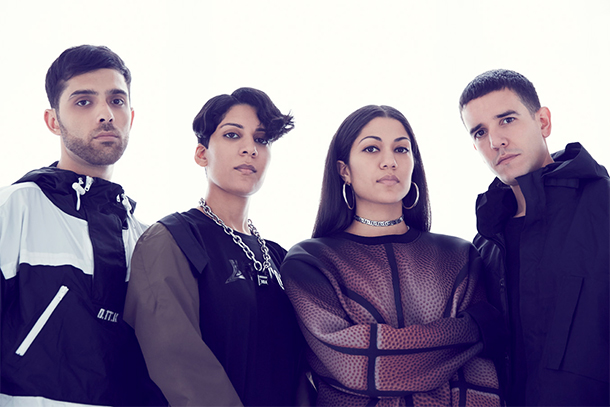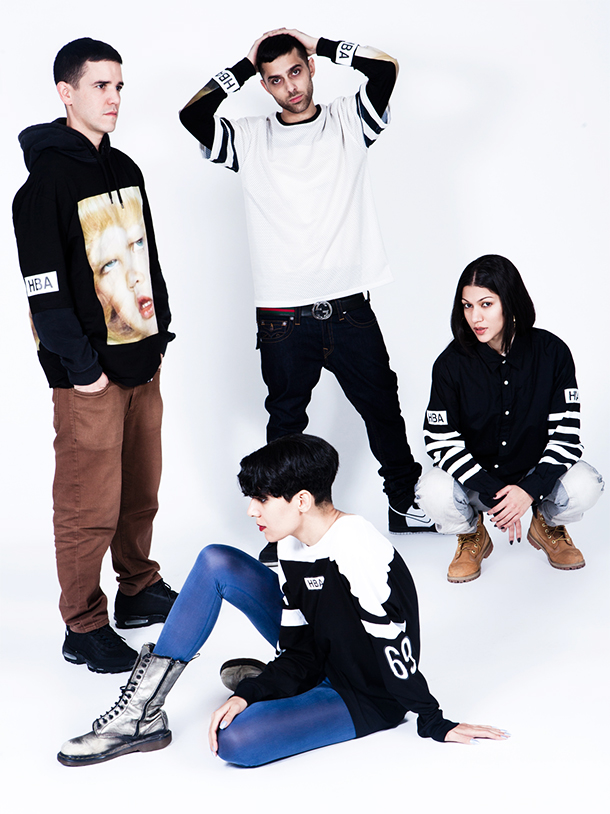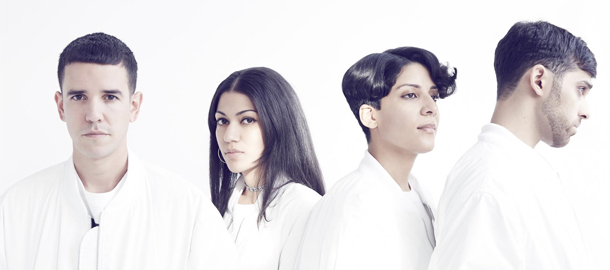Text: Geeta Dayal
A German translation of this article has been published in Groove 153 (March/April 2015)
Future Brown are the first supergroup to emerge in 2015: A collective of producers with roots in Kuwait, Los Angeles, New York and London that has set out to change the face of club music with its idiosyncratic blend of grime, rap, reggaeton, footwork and house. Geeta Dayal met the four-piece in Los Angeles prior to the release of their debut album.
I meet Future Brown – the team of electronic musicians Fatima Al Qadiri, Jamie Imanian-Friedman, Daniel Pineda and Asma Maroof – in the Koreatown neighborhood of Los Angeles. Koreatown feels surreal and almost psychedelic on this bright, hot January day in LA. Most of the signs in Koreatown are in Korean, not in English; looking at the riot of Korean markets, cafes, and restaurants, you could almost imagine that you’re in downtown Seoul. But there’s a particular LA flavor – the long, wide avenues are lined with tall, swaying palm trees, and rows of Art Deco buildings with terra cotta facades. I pass by waves of Korean and Latino immigrants, students, and hipsters, and head up the stairs of a nondescript white tower block. Inside Maroof’s small Koreatown apartment, Al Qadiri, Imanian-Friedman, Maroof and Pineda are sitting in a circle, surrounded by synths, samplers, and laptops.
Future Brown’s self-titled full-length debut has dropped this month on Warp Records, but they’re already ahead of themselves, busy recording their second album. Their Warp debut features collaborations with a bewildering array of vocalists, many of them women -rising R&B star Kelela, the rapper Tink, and longtime Ludacris collaborator Shawwna, for starters.
Stream: Future Brown – Room 302 feat. Tink
Future Brown are a bit of a supergroup themselves, even without all the high-profile guests: Al Qadiri recently caught attention for her solo album on Hyperdub, Asiatisch; Imanian-Friedman, also known as J-Cush, runs the small but well-regarded ‘global club music’ label Lit City Trax, which includes releases by Traxman, DJ Marfox, Spinn and the late DJ Rashad; and Pineda and Maroof are better known under their duo name Nguzunguzu.
Magic mushrooms in the forest
As the story goes, the name Future Brown was dreamed up in the haze of a magic mushroom trip in the forest. It’s a catchy name for a band, but is it also meant to be a conceptual statement, or a comment on the band’s own potent mix of ethnicities? The members of Future Brown hail from a wide variety of backgrounds – Al Qadiri lived for many years in Kuwait; Imanian-Friedman is half-Iranian; Pineda is Puerto Rican by way of Oklahoma, and Maroof is of Indian descent. But Al Qadiri is wary of reading too much into the name.
“I think that regardless of whatever you name yourself as a band, if it’s not your real name, that’s going to be a question that’s going to be asked of you almost for the rest of your career,” Al Qadiri says.
It’s hard to pin down Future Brown’s sound, which fuses elements of hip-hop, R&B, grime, and club music. The disorienting track “Room 302,” featuring Tink, sounds like a syrupy R&B slow jam cut with aggressive rapid-fire rap interludes. “Talking Bandz,” featuring Shawwna and DJ Victoriouz, has a dark, menacing grime undertow.
Stream: Future Brown – Talkin Bandz Feat. Shawnna And DJ Victoriouz
The group loves talking about the music that inspires them: grime, footwork and juke, UK funky, reggaeton, and Chicago house, for starters. Grime, especially, is a major touchstone, despite the fact that it never really took off big time in the US. But Pineda thinks that grime will have its moment. “Grime was ahead of its time,” says Pineda. “Now you have Wiz Khalifa working with grime MCs like Skepta, you have Diddy sourcing beats through Kiss or Radio 1 DJs … now it’s more international, people have caught up to the sounds. it was so far ahead and so crazy.”
“Grime is more of an attitude.” Jamie Imanian-Friedman
Imanian-Friedman spent ten years living in London, immersed in a crash-collision of sounds and cultures. “Grime is more of an attitude,” says Imanian-Friedman excitedly. In London, he says, “you can be in one area and hear one sound, and walk another block and hear another sound,” he says. “Going from one continent to another, that’s the sound of London.” In many ways, Future Brown sounds like a group that could have come from London.

Jamie Imanian-Friedman, Fatima Al Qadiri, Asma Maroof, Daniel Pineda
Al Qadiri likes grime because it’s amorphous – hard to classify in a simple category. “The thing with grime that’s really interesting is that you can’t really pin it down,” says Al Qadiri. “You can’t say the hi hats are like this or the kick drum behaves this way… grime is all over the place. That’s the beauty of it.”
You can find a strong grime slant to many of Future Brown’s tunes, and sometimes a ‘sino-grime’ flavor as well, a grime sub-genre that involves liberal use of so-called ‘Chinese’ or ‘Japanese’ sounds, like synthesized flutes played on a pentatonic scale. In Al Qadiri’s solo album Asiatisch, she played a lot with those sounds, in service of a larger statement. “There’s so much villainy, so many stereotypes,” she says. “Orientalism has been around for a very long time but it’s been constantly morphing, and my record was just an update in a long dialogue about Orientalism, also in music.”
“I’m Asian, from Kuwait, and if it’s not in Asia where the fuck is it?” Fatima Al Qadiri
“Asia is not a country,” Al Qadiri continues. “Who is Asian? What are you talking about? I felt like that term was so problematic, and it was the tip of the iceberg with all the problems of Orientalism: Being painted with one brush. Deleting all of the incredible diverse ethnicities, languages. India alone has so many different languages, different people, etc. But to say Indian people are Asian, or Chinese people are Asian, or Japanese people are Asian, was also problematic for me, because nobody ever called me Asian. I’m Asian, from Kuwait, and if it’s not in Asia where the fuck is it? Asia means something different here. It also means something different in the UK. It’s just a problematic thing in general to name something as Asian.”
Do you speak Japanese?
The single ‘Vernaculo’, from the new Future Brown album, sounds like it could be reggaeton, but it also has some Japanese lyrics. Maluca, the track’s guest vocalist, does a segment in Japanese at the end. “She says ‘Do you speak Japanese? My name’s Maluca’,” says Al Qadiri. “But I feel like most of the record to me doesn’t have too much of an Asian influence. Maybe the flutes conjure that, but they’re also really prevalent in rap and grime as well, so it’s a very pleasant sound for producers. I think that was one of the points i was making with the Asiatisch record–there is a prevalence of this pseudo-Chinese, pseudo-Japanese music in rap and grime, because it’s viewed as being popular, it’s viewed as having agency. It has to do with martial arts; it has to do with power, power against your rivals.”

If Future Brown has a patron saint, it might be the late DJ Rashad, who was a major inspiration to the group. Tears begin to fall from Pineda’s eyes when Rashad’s name is mentioned. “Over the years I’ve been hugely inspired by the footwork scene, and juke and house music,” Pineda says. “Chicago music in general has been major. Rashad was a friend and a super inspiring person, and it’s tragic that he’s not around, but I think Teklife, his whole crew, is doing amazing things.”
“In Rashad’s music, he would take so many different ideas and be able to flawlessly put them together,” says Imanian-Friedman. “It wasn’t basic sequencing–it was deeper music. It was conscious, hidden messages in the music. There was always crazy levels of thinking going on.”
Rashad’s way of working was inspiring too. “When Rashad would work, it would just flow,” Pineda says. “It would go like crazy. He just worked super fast. It was nuts.”
Future Brown is starting to hit their flow as a group. “Most of what we’ve produced together, we’ve all been in a room mainly using one computer and I like to use an [Akai] MPC as well, or some other little hardware,” says Pineda. “But mainly it’s a computer and we brainstorm, and lately we’ve been trying to write as much as possible. It’s a lot of bouncing ideas around and having fun in a room–everyone putting their input, ‘Ooh that’s cool’. It’s pretty natural, I think a lot of people could think: ‘Oh I could do that too’.”
“We’re like siblings, we’re like sisters and brothers,” says Al Qadiri. “We’re like a family, and like with all families there’s a range of emotions that come into it.”
Stream: Future Brown – Mix for Carhartt WIP Radio
